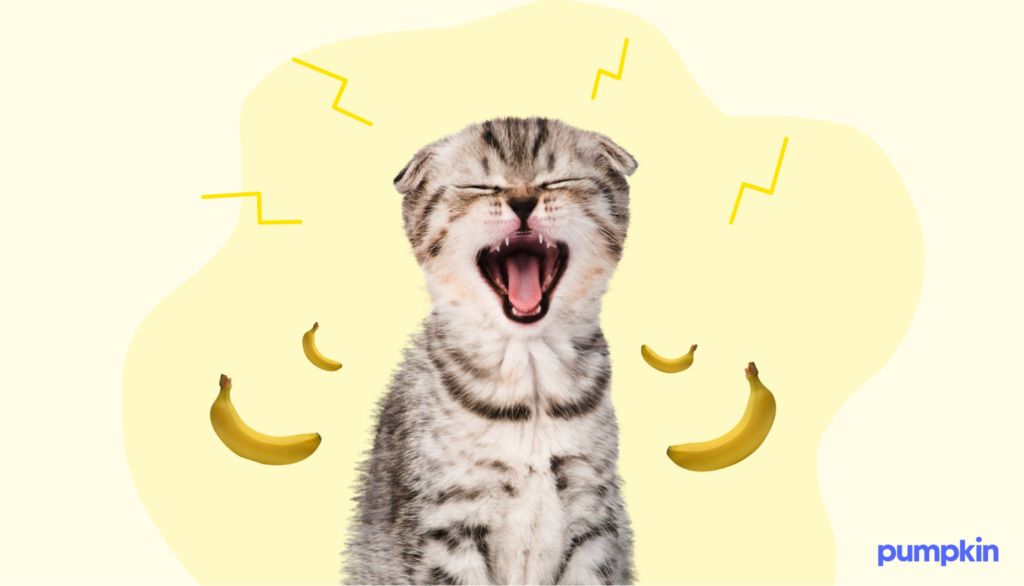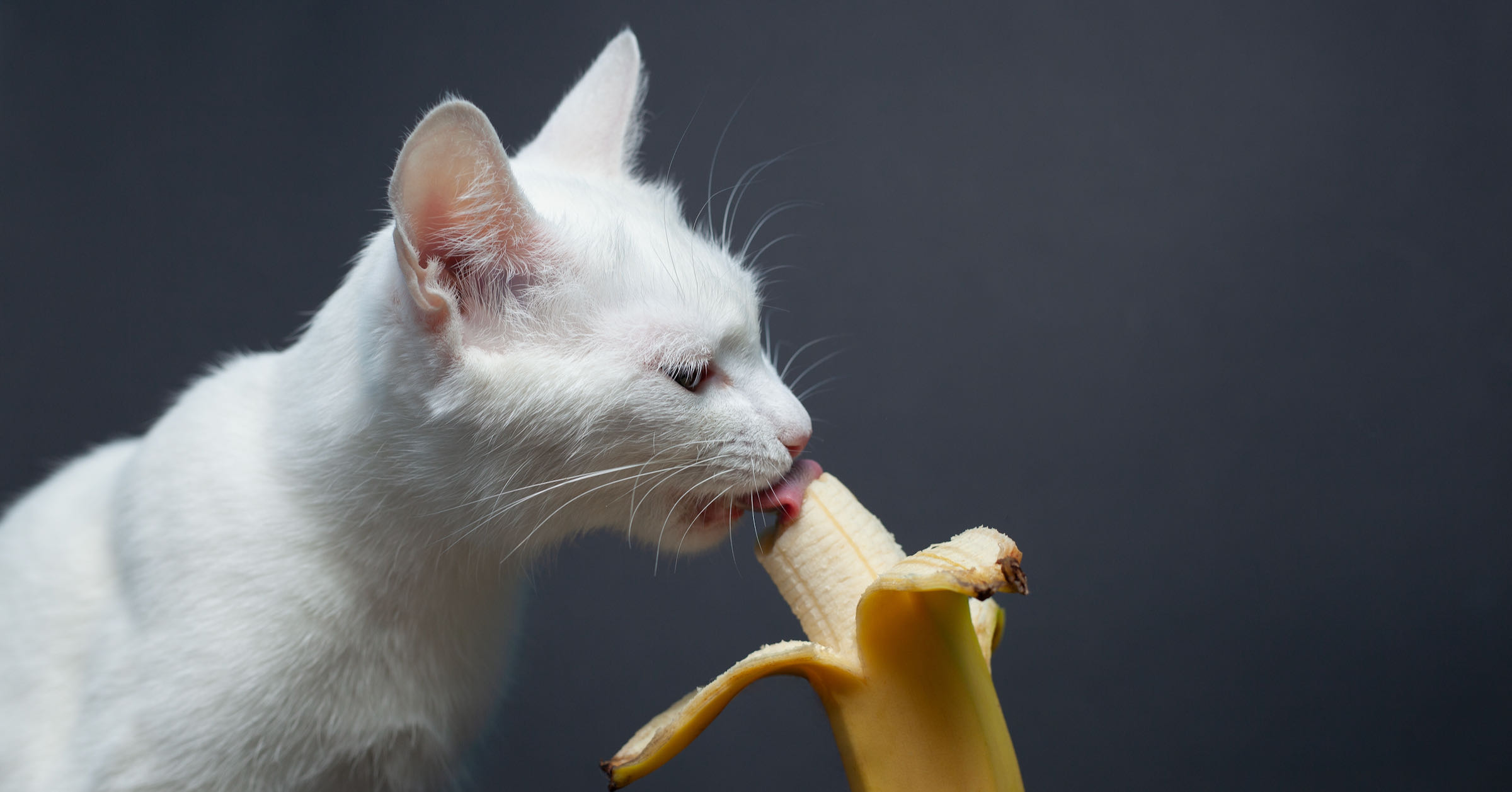Key Points
- Cats can eat bananas but may not like the taste.
- Cats can’t digest plant materials, so they won’t receive many nutritional benefits from eating bananas.
- If your cat enjoys bananas, share this fruit in moderation — a 1-inch piece is enough.
We know bananas are a go-to snack for humans and are even safe for dogs. They’re packed with fiber, carbohydrates, and a ton of good-for-you nutrients.
But what about our cats? Can our whiskered companions safely enjoy a nibble of this delicious yellow fruit?
The short answer is yes — bananas are safe and non-toxic to cats. The real question, however, is whether bananas offer them any nutrition.
Should cats eat bananas?
Cats are obligate carnivores, which means that a cat’s body requires nutrients primarily found in animal proteins. That means a vegetarian diet is a big no for cats!
The key components of a cat’s diet include high levels of protein, moderate fat, and a minimal amount of carbohydrates. Cats also require nutrients such as vitamins, minerals, and fatty acids, which can be found in animal products.
Commercial cat foods are designed to meet all of your kitty’s dietary needs. There’s no need to supplement their diet for added nutritional benefits, unless your vet directs you to. In fact, sometimes, it can be harmful to add new foods or supplements to your cat’s food bowl.
Health benefits of bananas for cats
While bananas are chock full of vitamins and minerals that people and dogs can benefit from, cats don’t have the enzymes needed to digest plant-based foods.
Because of this, the only health benefits that cats get from bananas are dietary fiber. All that potassium, calcium, and vitamin C is wasted on our feline friends.
Risk of feeding bananas to cats
Let’s look at some risks of feeding your kitty bananas.
1. High in calories and sugar
Bananas are relatively high in calories compared to other fruits. A medium banana (about 100 grams) contains 89 calories. This means bananas should be a very occasional snack for cats.
Bananas also contain a lot of carbohydrates, which turn into sugar in the body. Too much sugar for our pets can lead to diabetes, and cats are no exception.
Cats who have health issues like diabetes or obesity should avoid eating bananas. Likewise, overweight cats don’t need the extra sugar in fruits either. Over time, excess sugar can lead to diabetes and blood sugar spikes.
Signs of diabetes in cats include:
- Excessive thirst
- Weight loss
- Increased urination
- Loss of appetite
- Inability to jump
- Vomiting
2. Hard to digest
Cats can be sensitive to some foods, which may cause vomiting, diarrhea, constipation, or other signs of gastrointestinal upset. Make sure you observe your cat after they ingest new foods. Plant-based foods can cause your cat discomfort since they lack the enzymes to digest or process them.
3. Allergic reactions
Fruit allergies aren’t very common in pets, but they can happen. Signs of an allergic reaction in cats are:
- Itchy rash
- Watery eyes or nose
- Itchy mouth or throat — your cat will paw at those areas or rub against something
- Swelling of the mucous membranes around the nose and mouth, tongue, or gums
- Wheezing from a narrowing throat
This may sound scary, but it’s very rare. If you do notice any of these signs, talk to your vet immediately.
And if you’re worried about the costs of caring for your cat, consider getting pet insurance to help with the costs of any eligible visits to the vet in the future.
4. Choking hazard
The texture of bananas could pose a choking hazard, especially when they aren’t cut into small pieces or mashed. (The banana peel also presents a choking hazard for pets.) Since cats aren’t used to the consistency of bananas, this may make it difficult for them to swallow.
How to feed banana to your cat
You can safely offer a small piece to your cat if they insist that your banana is the perfect snack. Keep in mind that your cat may appear interested in the banana, but once you offer it, they may turn away in disgust.
Here are some steps you can take to feed this fruit to your cat safely:

1. Remove the peel. The fruit is the only part of a banana that your cat can eat. The peel is too difficult for them to digest and can lead to choking, digestive tract issues, or an upset stomach.
2. Cut the banana into small pieces. Alternatively, you can mush it into purée and put it on top of their food.
3. Introduce only one new food at a time. That way, if your kitty has a bad reaction (such as bolting to the litter box), you’ll know the source of the problem.
How much banana can cats eat?
Considering the average healthy weight for a cat is between 8 and 12 pounds, they need between 225 and 310 calories per day. Depending on their size, a medium banana takes up nearly half of their calorie intake.
So, if you want to feed a banana to your cat, make sure you give it to them in very small portions. No more than 10% of a cat’s diet should come from treats, and in this case, a small 1-inch piece should suffice.
Can kittens eat bananas?
For the first 12 months, kittens need to eat specially formulated kitten food that provides them with the essential nutrients to grow properly. That said, you can share tiny treats, including small pieces of fruit, closer to the end of this period.
Just make sure to cut the banana into even smaller pieces than you would for an adult cat.
What are alternatives to bananas?
Aside from bananas, your cat can eat many other fruits — also in moderation.
- Strawberries
- Watermelon
- Blueberries
- Blackberries
- Cranberries
- Raspberries
- Mangoes
For more details about what your cat can and can’t eat, refer to Pumpkin’s Ultimate “Can My Pet Eat That?” guide.
The next time your kitty is looking at you with those Puss in Boots eyes, practically begging for a small piece of banana, you can offer them a nibble. Bananas aren’t going to hurt your kitty if they have a small piece every once in a while. Just don’t overdo it and focus on giving your cat a balanced diet primarily filled with animal protein.
FAQs
- https://www.vet.cornell.edu/departments-centers-and-institutes/cornell-feline-health-center/health-information/feline-health-topics/feeding-your-cat
- https://fdc.nal.usda.gov/fdc-app.html#/food-details/173944/nutrients
- https://www.petmd.com/cat/nutrition/can-cats-be-vegan-or-vegetarian
- https://www.petmd.com/cat/general-health/average-weight-cats
- https://wsava.org/wp-content/uploads/2020/07/Calorie-Needs-for-Healthy-Adult-Cats-updated-July-2020.pdf
- https://www.petmd.com/cat/nutrition/how-much-to-feed-a-cat
- https://www.petmd.com/cat/general-health/what-smells-do-cats-hate
- https://www.themeowblog.com/why-are-cats-scared-of-cucumbers-and-bananas/
- https://www.youtube.com/watch?v=0b8vTHjsF0Y




